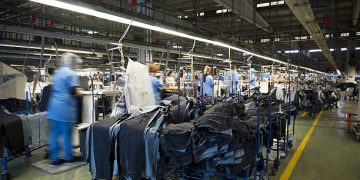Indonesia has recently implemented import duties on goods, primarily from China, in an effort to protect its domestic industries from competition. This significant policy change has sparked debate about its potential impact in an interconnected global economy.
In recent weeks, Indonesia’s trade policy has garnered both domestic and international attention. The government has decided to impose import duties ranging from 100 percent to 200 percent on textile goods, primarily from China. This decision has elicited mixed reactions and raised questions about its economic and diplomatic consequences.
Indonesian Trade Minister Zulkifli Hasan has explained that the move aims to protect the domestic textile industry from what is perceived as unfair competition due to overcapacity in China. This situation, exacerbated by global trade tensions, has led to an influx of inexpensive Chinese textiles into Indonesian markets, adversely affecting local manufacturers. Reports indicate significant job losses and numerous company closures, as local businesses struggle to compete with low-cost imports.
The Indonesian Textile Association (API) has highlighted the severe impact on specific companies, such as PT Kusumahadi Santosa and PT Pamor Spinning Mills, where thousands of workers have been laid off. These developments underscore the need for government intervention, but whether steep tariffs are the right solution remains a contentious issue.
Luhut Binsar Pandjaitan, Coordinating Minister for Maritime Affairs and Investment, supports the tariffs as part of broader measures to protect various industries, including ceramics, cosmetics, electronics, footwear, and apparel. Zulkifli Hasan has clarified that the import tariff, ranging from 50 percent to 100 percent, will depend on its impact on local industries.
Critics argue that such a drastic measure could backfire in a globally interconnected economy. Virdika Rizki Utama from PARA Syndicate warns that high tariffs, particularly if perceived as discriminatory towards China, could lead to retaliatory actions and strain diplomatic relations. This potential fallout could extend beyond economics to geopolitics, potentially isolating Indonesia and undermining its global trade position.
Additionally, there are concerns about the socio-economic implications. Higher prices could disproportionately affect lower-income households, potentially increasing economic disparities within Indonesia. Economist Faisal Basri argues that high tariffs should be applied only in cases of dumping, emphasizing the importance of countervailing duties to address subsidies provided by exporting countries.
Beyond protectionism, strategic considerations are at play between Indonesia and China. The high import duties can be seen as a tactic to appease local business interests and attract Chinese investors to Indonesia’s textile sector. Recent discussions with Chinese garment and textile investors have highlighted potential new factories in Kertajati, Majalengka, and other regions, promising to boost employment and integrate Indonesia into global supply chains.
While these investment plans could benefit Indonesia, the local textile market would still be predominantly controlled by Chinese companies, maintaining their influence over domestic production.
As Indonesia moves forward, it must navigate a delicate balance. While protecting domestic industries is essential, policy decisions must be informed by thorough analysis of their economic and diplomatic implications. Measures such as countervailing duties and enhanced quality controls could support local industries without disrupting global trade relationships.
In conclusion, Indonesia faces a critical decision that will shape its economic future. By fostering a conducive environment for both local and foreign investments and maintaining an open dialogue with global partners, Indonesia can aim for sustainable economic growth and inclusive prosperity. The path ahead requires careful consideration, pragmatism, and a commitment to navigating the complexities of the global economy.
Dr. Muhammad Zulfikar Rakhmat is a researcher at the Center of Economic and Law Studies, focusing on China-Indonesia-Middle East relations. Yeta Purnama is also a researcher at the Center of Economic and Law Studies.
This article is published under a Creative Commons License and may be republished with attribution.
Stay informed with supply chain news on The Supply Chain Report. Free tools for international trade are at ADAMftd.com.
#IndonesiaTrade #ImportDuties #EconomicPolicy #TradeProtection #SupplyChainNews















